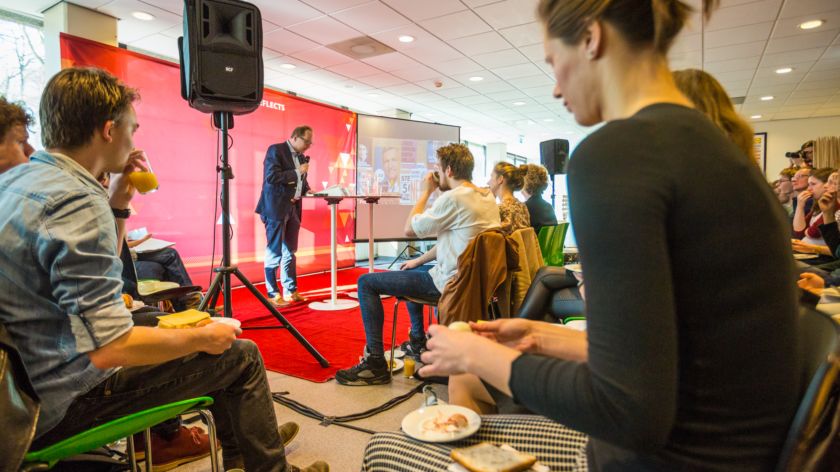The Dutch elections: and now what?
-
 Photo: Marjolein van Diejen
Photo: Marjolein van Diejen
This morning, the day after the general elections, Radboud Reflects organised the 'formation breakfast'. Four experts forecast the composition of the next Cabinet, based on the preliminary results. Who will take a seat in the government benches next to VVD, and do the results signify the defeat of populism?
Once again, Nijmegen revealed itself yesterday as a left-wing town. Although the preliminary results show a victory for GroenLinks, the mood the day after is somewhat gloomy. During the traditional ‘formation breakfast’ this morning, it became clear that GroenLinks still has some hurdles to face if it is to participate as a governing party.
‘It would be nice if a woman could play a part in things’
Since the exit poll yesterday evening, it has been clear that, despite losing some seats, the VVD has again won the Dutch elections. Parliamentary historian Alexander van Kessel said this morning: ‘I heard that Mark Rutte taught his Social Science class at half past eight this morning as usual. Later this morning, in the party’s meeting, he will take the lead in the formation of the new Cabinet.’ Someone will be appointed to explore possible coalitions, on behalf of the VVD. ‘Annemarie Jorritsma’s name is being mentioned. It would be nice if a woman could play a part in things’, says Van Kessel.
Carla van Baalen, director of het Centrum voor Parlementaire Geschiedenis (Centre for Parliamentary History) addressed the matter of the composition of the coalition over breakfast. Three parties won’t work, four or five will. Her first lesson: the fewer parties involved, the greater the chance of agreement. ‘There will probably be four parties in the Cabinet. This is nothing new, but it is always troublesome, because everybody wants to have their voice heard in the coalition.’
Engine of the new Cabinet
There was little doubt about the basis of the new Cabinet this morning: Van Baalen called the ‘engine’ the three parties: VVD, CDA and D66, together worth 71 seats. Since a minority government is not the norm in this country, Van Baalen expects that a fourth party will join: first GroenLinks, as the biggest winner, and then the ChristenUnie.
GroenLinks may be ready to govern, but according to Van Baalen, after a period in the Cabinet, the party will suffer the same fate as the PvdA (Dutch Labour Party). In addition, relations between GroenLinks and the VVD are not so great. The ChristenUnie, which made use of the final debate yesterday evening to fish for a place in the coalition, seems to Van Baalen to be a much more obvious choice. ‘This party offers fewer breaking points than GroenLinks.’
‘Wilders will have to re-consider his strategy’
Sophie van Bijsterveld, member of the Senate and a professor in Nijmegen, shares Van Baalen’s analysis. The last Cabinet operated for years despite a minority in the Senate, and still succeeded in getting important laws passed by the Senate, thanks to the ‘constructive three’, which did not contain GroenLinks, but the ChristenUnie (together with D66 and SGP). Van Bijsterveld: ‘It may be that the ChristenUnie will now be rewarded for its cooperation.’
One-man show
The PVV, actually the second-largest party in the Netherlands, was conspicuously absent in all the forecasts. Can this result be seen as a victory over populism? Political scientist Andrej Zaslove: ‘Much of the foreign media was becoming almost hysterical about populism, due to Trump and the Brexit. I had to tell them: “Take it easy, things don’t go like that here”. However, he does warn against underestimating populism. Zaslove: ‘It has influenced the standpoints of other parties.’ He also feels that populism is becoming ‘increasingly normal’. ‘It really has become a part of our political system.’ In his opinion, Wilders needs to take stock: remain in the wings or collaborate with other parties. ‘Wilders will have to re-consider his strategy, or his one-man show may well come to an end.’



